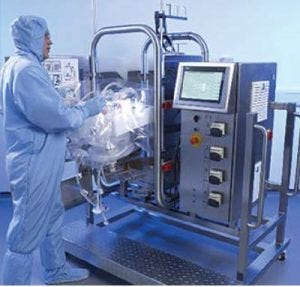- Sponsored Content
- Bioreactors
- Single Use
Navigating Technology TransferNavigating Technology Transfer
Sponsored by Cytiva

Marie-Laure Collignon and Shahin Heshmatifar
Technology transfer is a key milestone in the journey from discovery to full-scale good manufacturing practice (GMP)-compliant manufacturing. Navigating this step while preventing unforeseen issues that can create costly delays is supported best by combining knowledge of a given process with understanding of the technological capabilities.
Different applications have different needs. Some challenges and goals are common to bioreactor processes for suspension and adherent cell culture for production of viral vectors, monoclonal antibodies (MAbs), other recombinant proteins, and vaccines. All those applications need improvements in productivity, yields, and efficiency while maintaining critical quality attributes (CQAs) established at small scale. Such goals can be met only through optimizing the right technology and using it in a way that delivers required performance. Here we discuss how specialist teams at Pall Biotech approach technology transfer and work with end users to ensure a successful outcome. Then we focus on development and technology transfer for a new application of our Allegro STR single-use bioreactor system as a case study.
Support
What scientific and technical support do users have access to in their technology-transfer processes? Even the most skilled process developers can benefit from specialist knowledge sometimes. It can be gained from experience, from direct understanding of individual technologies, and through collective knowledge of similar successful processes.
Teams within Pall Biotech Scientific and Laboratory Services specialize and offer support for operations in cell culture/upstream production, downstream purification, and formulation and filling (of both drug substance and drug product). This extends to providing knowledge relating to process validation and the regulatory landscape. Each subject brings its own unique challenges, and they combine to require a solution that is tailored to meet end-user needs.
Optimized unit operations must take desired manufacturing methods into account. For example, the guidance we provide can be different for fed-batch processes and those that operate continuously — and for single-use technologies and large-scale processes using stainless steel equipment. When uncertainty arises, our Accelerator process development services team can help by working with you to establish the best way forward using Pall’s dedicated development laboratories.
For an upstream example, our global team of bioreactor applications scientists (BASs) is specialized in cell culture technologies and helps at every stage, from initial testing and consultancy to facilitating the adoption of new technologies during clinical manufacture, through training and troubleshooting. We know that strong relationships are key to success, so each end user is assigned a BAS team member to coordinate all technical and scientific discussions.
Custom Solutions
How do Pall experts provide a customized solution, and what information should be provided to them? This starts with a specialized questionnaire to capture the core goals of a project and serve as a framework for early discussions. Initial meetings use the provided information to review a process and define short- and long-term goals. Once clarified, the project progresses quickly to a detailed experimental plan, with each process customized to accommodate the goals and deadlines of the client.
When planning for successful scale-up, knowledge transfer is an essential component of technology transfer. It is easy to focus on how this empowers end users ultimately to achieve seamless transition, but it is just as important at project initiation. With necessary confidentiality protection in place, we can review an existing process in detail and use that to inform our experimental plan.

Allegro STR bioreactor system
Single-Use Bioreactors
How does a BAS member design a customized experimental plan? The questionnaire collects critical engineering parameters relating to an existing process: power input per unit volume, gas hold-up, maximum oxygen transfer rate (OTR), and shear stress. Those allow us to create a set of operating parameters for a given Allegro bioreactor system. When combined with primary characterization data for the bioreactors, the information helps determine which controls will be needed to achieve equivalent culture conditions to those at smaller scales. That maximizes the likelihood of success from the first trial and can include impeller agitation rate and, if required, the rate of sparged aeration.
What level of characterization data is available for Allegro stirred-tank bioreactors? Data inform decision making and provide an especially strong starting point for scale-up and technical transfer of cell culture processes. Knowing this, we have several application notes that provide a foundation of empirical data regarding temperature mapping, mass transfer (kLa), mixing times, and CO2 stripping to define the performance of these cubical biocontainers. We also combine that information with computational fluid dynamics (CFD) simulations that help create simplified, user-friendly models. When a simple spreadsheet can generate proposed operating conditions, everyone can understand the role of each process variable — thus derisking development and accelerating the journey to a successful full-scale process.
Does the cubical shape of a Allegro STR bioreactor affect technology transfer? The cubical geometry sometimes brings up such questions. But directly comparing performance shows that it is at least as good as that of bioreactors using cylindrical geometry. That should be no real surprise. Baffles in the Allegro STR design perform the same way as they do in glass bioreactors, where they prevent vortex formation. They serve to promote efficient mixing in all directions, including the corners that generate such attention.
That is confirmed through CFD modeling and extensive mixing studies showing that the cubical shape (with baffles) scales well from small-scale glass bioreactors. We should acknowledge that the corners come from a format that reduces significantly the footprint needed for a given culture volume and offers substantial usability advantages. Benefits that come with the innovative shape do not affect technology transfer across the range of volumes served by the Allegro STR bioreactor family.
Does the family demonstrate reliable and predictable scalability? The 50-L, 200-L, 500-L, 1,000-L, and 2,000-L designs all share the same aspect ratio and the same impeller and sparger design. So when you maintain a constant power input and gas hold-up per unit volume and use system control loops to maintain a target dissolved oxygen (DO) level, your system will achieve the same performance. Thus, the Allegro STR bioreactor family delivers good scalability and predictability with regard to all the usual biological attributes.
Interested?
What technical support and tools are available to help interested parties? We understand the power of process knowledge and the need to transfer it in the right way. Explicit knowledge can be shared easily through publications and modeling tools, but tacit knowledge often provides the true key to success. A nominated BAS can help a developer interpret data and use those tools in the context of specific process needs. Consultation, discussion, and training can be delivered conveniently and effectively for each end user, whether through on-call support and guidance or face-to-face and hands-on help, giving users direct access to the collective knowledge and experiences of a global team of experts.
Ultimately the knowledge exchange necessary during technology transfer creates close technical relationships that deliver long-term benefits beyond individual project milestones. Application specialists naturally remain engaged with developments and available to provide ongoing consultancy, guidance, and support whenever needed. We are privileged to work with so many companies to advance the industry and improve lives. When confidentiality allows, the team’s open-minded, collaborative approach makes us happy to explore opportunities for working together and publishing jointly. Sharing knowledge is the core of what our specialists do.
Marie-Laure Collignon, PhD ([email protected]), and Shahin Heshmatifar, MSc, PhD, AMIChemE, FHEA ([email protected]), are senior bioreactor applications scientists and members of the cell culture technologies team at Pall Biotech. For more information, email [email protected]. Allegro is a trademark, and Accelerator is a service mark of Pall Biotech.
This pre-print was published on the BioProcess International website on May 20, 2020.
You May Also Like





